#msc in life sciences
Text

#icsi training#pg diploma in clinical embryology#msc in life sciences#clinical embryology courses#VaramReprogenesis
1 note
·
View note
Text
cuet pg safe score for jnu msc Admission | cuet pg 2024 exam | kapil sir ninjaprep
✅ CUET PG 2024 is a national-level postgraduate entrance exam conducted by the National Testing Agency (NTA) for admission to various postgraduate programs in central universities and other participating universities across India. This video is an essential resource for all students who are planning to take the CUET PG 2024 exam. Watch it now and start your preparation on the right foot! #cuetpg2024 #cuetphysics #cuetphysics #cuetpg2023 #cuetpgtest #cuetpg #cuetkyahai #cuetpgexamcriteria #cuetadda247 #cuet2024 #cuetpg2024 #cuetpg #cuetpgpreparation #cuetpgexamcriteria
#cuet pg 2023 syllabus#cuet pg exam preparation#cuet pg 2024 roadmap#cuet pg roadmap#cuet pg exam preparation 2024#cuet pg best preparation#cuet pg preparation#cuet pg mba#cuet pg llb#cuet pg life science#cuet pg eligbility#cuet pg exam date#cuet pg kya hota hai#cuet pg 2024 preparation strategy#jnu msc mathematics#jnu pg eligibility#cuet pg jnu#ninjaprep physics#cuet pg preparation 2024#cuet pg jnu cut off#cuet safe score for jnu#cuet pg marks for jnu#cuet pg physics preparation#cuet pg 2024 jnu#jnu admission process
1 note
·
View note
Text
but what if I did computer science though
#mine#personal#uni#one of the master's programmes at the uni close to here that i'm interested in#is basically a computer science MSc for humanities graduates with no prior knowledge#it sounds like it would be really useful to do and also like i might get less frustrated the way i do with in-depth humanities discussions#so right now i'm fighting the urge to say fuck it and immediately start doing this in the summer semester#i need time i need time i need time i am NOT rushing into a major life decision again just bc the first thing i can think of sounds good#and if i've done my research and thought about my options and STILL think this is the thing to do#then later on when i struggle i'll have hard evidence that i'm doing something i decided on after careful consideration#but. anxious brain says 'start now because what if they suddenly stop offering that programme'
1 note
·
View note
Text
Maria Skłodowska-Curie. That's it, that's the post.
As per my poll, here's a post on MSC!
This post began as a bit of a messy thing. I wanted to write about MSC because she was a brilliant Polish woman who became one of the most important scientists of modern chemistry and physics and I, as a Polish woman and a science major, admire her greatly. But the whole thing was vague and lacked direction. I received some kindly advice though and decided to focus on this: what was Maria like? Everybody knows she had an exceptional mind, that she had close ties with Paris, that she discovered radium and polonium, that she received the Nobel prize twice… But did you know she was said to have “serious, gray eyes” or that her initial plan was to spend her life working as a teacher or that she loved her homeland deeply? Underneath her doubtlessly exceptional achievements she was a person, and I’d love to take a look at that.
Maria Skłodowska ("skwo-DOV-ska") was born on 7 November 1867 in Warsaw under Russian occupation. Her father was a mathematics and physics teacher, so it may seem natural that little Maria took an interest in science, but as a child she was a phenomenal student in general, no matter the subject; she read a lot of books, and she learnt to read very early. She was considered very gifted.
Her family wasn’t rich by any means. Maria’s father – a Polish man, a school teacher under the tzar’s merciless reign – knew very well he couldn’t afford to give all his children the education he wanted for them, not to mention neither Maria nor her older sister Bronia were allowed to attend university in occupied Poland. Making their dreams come true – studying at the Sorbonne – depended on the money they didn’t have.
At 17 Maria made a decision: she was going to work as a teacher while Bronia pursued medicine in Paris with the help of the money earned by Maria. After Bronia’s graduation they would switch: Bronia was going to work as a doctor while Maria attended university.
It was by no means an easy task. During the following years Maria had to withstand not only immensely hard work and a longing for learning, but also unfair employers, lack of respect, and heartbreak. But she persisted. She was 24 when finally she was able to pack up and take the train to Paris.
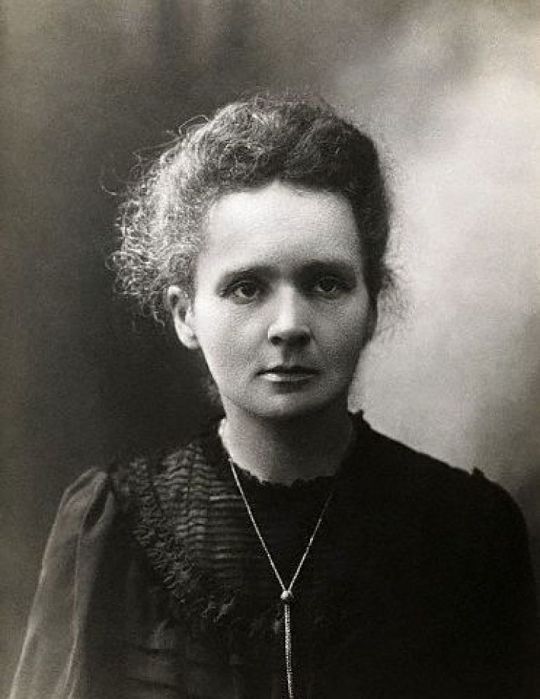
[source]
Soon after taking up her studies at the Sorbonne did Maria realize how far behind the other students she was: they were able to pursue an official education in a free country, something she’d never gotten to experience before. She had been an excellent student back in Poland, a fluent French speaker, but now it turned out her knowledge was lacking. Obviously, this couldn’t discourage her. Bronia’s husband Kazimierz wrote in a letter to her father that Maria would spend entire days at her university, only coming home in the evening. She worked admirably hard to catch up. And she was happy: at long last she could study science and mathematics in depth, the way she had longed to do for so many years.
Of course, money never stopped being an issue. Even with her father’s and sister’s help, she was still poor. She definitely wasn’t eating enough. In winter, she was cold. Other than that, she mostly gave up on her colleagues, refused to waste her time on “insignificant” things: that is, everything but studying, unfolding the secrets of chemistry and physics, practicing her laboratory skills. She was living and breathing science.
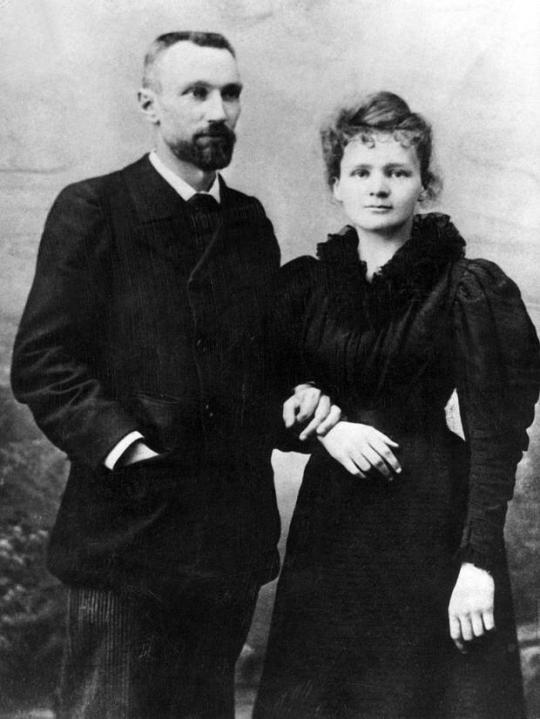
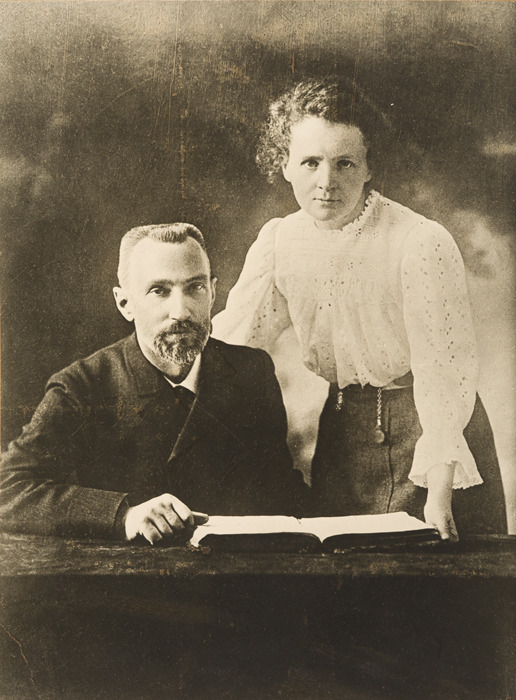
[left / right]
Pierre Curie was older, an exceptional physicist, charming and calm, still unmarried at 35 – he wouldn’t love a woman who couldn’t be first and foremost his intellectual partner. But Maria wasn’t looking for love and she certainly wasn’t looking for a marriage. She had a degree in physics, was on her way to get a degree in mathematics as well, all the while working on the magnetism of steel. And indeed, when they met through a professor who thought Pierre might be of help to young Maria, it was mostly curiosity, mutual respect, and primarily a great scientific interest that bloomed between them and brought them closer together.
Maria didn’t give in easily. All along her plan had been to earn her degrees and return to Warsaw, to her elderly father, and remain working as a teacher for the rest of her life. But there’s no doubt that when she eventually agreed to marry Pierre, it was out of genuine, deep love. They had a sincere, precious connection, both emotional and intellectual.
Did you know Maria and Pierre loved to travel the countryside on their bikes? They did. It’s how they spent most of their time together after their wedding. And not for a moment did they forget about their shared passion for science – they discussed it even during their travels. They lived together and they worked together. Their first child Irène – future Nobel prize winner as well! – was born in September 1897, Ève – their younger daughter – seven years later.
Pierre’s family adored Maria, Maria’s family loved Pierre. The two of them would frequently visit Pierre’s parents and they continued their biking trips, but other than that their life was utterly devoted to science. I know, it sounds like I’m exaggerating, but it’s true. Along with the fact they always had very little money, work was all they had.
Radium appeared in Maria’s life when she was working on her doctorate. Her laboratory was cold, damp, and badly equipped, but it seems to me Maria’s determination was inexhaustible. She began by studying uranium, but she soon figured out she had to include other elements in her research as well in order to solve the mystery at hand. It was only after a year of this work that Maria realized she might have discovered an element previously unknown.
Pierre was interested in Maria’s research before, but – save from the occasional advice as an older and more experienced scientist – he mostly left her to do her own thing while he focused on his crystals. At this point however, he was so intrigued he abandoned his research to work with Maria on her project. In 1898 (two years into Maria’s PhD work!) they published a paper together – in it they announced the discovery of a new element: polonium, named after Maria’s beloved homeland. Later that year, they did the same for radium. They coined the term “radioactivity”.
Maria kept a meticulous journal, not only for her laboratory work. She was carefully tracking their spending as well as Irène’s development, the way she learnt to walk and speak and play with their cat.
And so, her life continued: filthy, hard work in the infamous shed, a ton of an ore for less than a gram of product (!), countless papers published with her dearest husband, watching their daughter grow, earning her doctorate degree; then, in 1903, her first Nobel prize (along with her husband and Henri Becquerel).
The Nobel prize brought Maria and Pierre fame – and it was a tragedy. For them, at least. Modest and humble as they were, they couldn’t stand the journalists almost storming their garden, going as far as “describing [their] black and white cat [in the newspapers]” as Pierre said in a letter to a friend. I allowed myself to translate a piece of a letter that Maria sent to her brother in 1904 amid the post-Nobel craze, as it’s both sad and hilarious:
“I wish you health [for your name-day], well-being for all of your family, and for you never to experience the sort of correspondence and assault that we are now subjected to.
Ever since that accursed Nobel prize we’ve been unable to do anything, and I’m beginning to ask myself if the money we received will be of any consolation, as, after all, the people who sell me meat, coal, sugar, etc. are richer than me yet they do not experience such sorrows.
[…] and yesterday some American wrote to me, asking for permission to name a race horse after me.”
Maria’s life took a truly sharp turn when Pierre died in an accident in 1906. Despite the tragedy that irreparably crushed her heart, she never ceased her work. She became a professor, organized classes for her and her friends’ kids, ran the Radium Institute, continued her research, received her second Nobel prize. During World War I it was her mobile X-ray machines that saved countless lives: she was active and involved, operating the machines with her older daughter and teaching others how to do it.

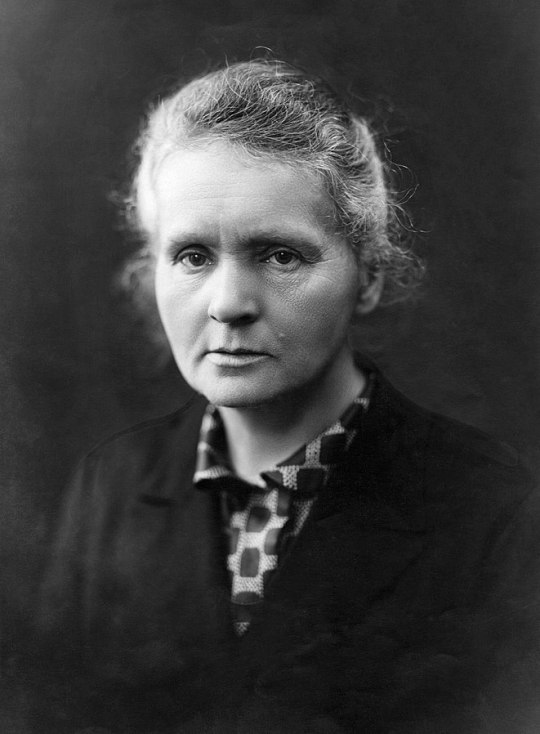
[left / right]
She lived long enough to see her dear, beloved Poland become an independent country once more. To the very end she remained humble and uninterested in fame, hardworking and dedicated entirely to science.
I based this post mostly on Madame Curie by her daughter Ève which I highly recommend!
#in the end i kept it long as you can see#but i think its consistent :)#mine#op#chemistry#chemblr#physics
54 notes
·
View notes
Note
Hi Meg, I was wondering if I could get your insight on something... I'm interested in bioinformatics as a career but am not sure whether I should pursue just a Master's or try for a PhD. How did you decide how far you want to go with your education? I noticed you mentioned you hope to do a PhD someday? Thank you so much!
hey anon! okay, so in this answer I'ma focus on two things:
my thought process behind finalizing on a PhD
my approach to furthering education
I. Why PhD?
1. I love my subjects. I love the interdisciplinary nature of computational biology and it's sister subjects and I can see myself in academia- constantly learning and researching and exploring.
2. Even on the off chance that if I don't pursue a career in academia, I think I need a PhD anyway? Most high level positions in the industry for life-sciences requires a level of expertise that only comes with a doctorate, and I think my career opportunities (+ growth) will be rather limited without it.
Considering these two points, a PhD would be most suitable for me.
———————
Now, choosing the right type of graduate program can always be challenging because there are so many ways to go about it, and I am a very indecisive person so this was especially difficult for me. Here is my approach
II. Factors I considered before taking my next steps
My Primary Short-Term Goal(s)
I opted for a B.Tech in Biotechnology after 12th grade, and it is through the course of this degree that I realized my interest in computational biology and bioinformatics. My undergrad focused on too many topics and often emphasized wet lab over dry lab, so although I'm graduating with a specialization in Medicinal and Computational Biology, I don't know nearly enough regarding the computational aspects
Thus, my short-term goal is to expand my theoretical understanding of the important aspects of bioinformatics & computational biology.
2. Course Options that Work
Now, I know that I want to continue my education, I've got two options- Masters and PhD. When I considered my immediate goal against these two options, I realized four things:
a. I'm not equipped with the required dry lab skills to dive headfirst into research.
b. I don't know enough bioinformatics to commit to anything long term right now
c. I'm looking for a course that feels like an extension of my undergrad
d. I want to keep my options open and consider all career opportunities
Given these three options (+ course-related expenses + my skill level), it made most sense for me to choose a MSc at the moment rather than a PhD.
3. How the Course Ties in to My Long Term Goals
As I mentioned, my long term goal is to do a PhD. However, my upcoming graduate course is actually an MSc by Coursework degree, which- unlike a Thesis program, focuses on skill development (especially industry related) rather than research. In fact, most Thesis Masters can be converted to a PhD, but my program does not have that option.
At first glance, this course might seem like it's going against my long term goal but consider:
- Industry related or not, I need to develop computational skills before I can pursue research
- After this course I might prefer to gain work experience for a couple years before opting for a PhD.
- My preferred uni(s) for PhD are different from my preferred uni for Masters.
[^To give an example on the last point, for masters i considered countries/unis known for their quality of education + closer to my home country (this will be my first time living abroad alone) but for my PhD, I'm looking at countries/unis that are pioneers in research for my subjects of interest (even if they are a lot farther away from home)]
So essentially, I'm relying on this course to give me the skills and knowledge I need for a PhD in the future, while also giving me a buffer to understand and align my future goals and plans. Jumping from this to a PhD would be a lot harder than from a Thesis Masters, but that's a risk I'm willing to take.
So yeah, this was the way I went about choosing both my short term and long term academic goals. I hope this provides a good starting point for you! Don't stress out too much about it though; the truth is that there is no right or wrong choice, whatever decision you make will warp around your intentions and work for you the way you want it to. Best of luck for your future endeavors!!! I'm sure it'll all work out <3
#idk if this makes sense but I hope it helps! best of luck anon!!#resources#studyblr#answered#bioinformatics#bio student#biology#regarding cpb#computational biology#study resources#biology student
28 notes
·
View notes
Text
9th September 2024, Monday
day 15/50 productivity challenge


💤: like 3hrs?
🕒 5:30 a.m. - my alarm's working again thank fuck, apparently i just needed to switch the battery
contemplated my life choices
prepared for psychology seminar
showered
morning skincare
extended duolingo streak
🕒 8:00 a.m. - left for school
crushed my psychology seminar yay (like the teacher said i genuinely presented my topics really well)
🕒 1:00 p.m. - back home !!
slept like a log 💤: +4hrs
🕒 5:00 p.m. - woke up lmao
discussed future stuff with my mom (got lots of clarity about what i want to pursue in the future, obviously my interests may change but i think my aim is for iisc. i already live in bangalore so that possibility feels even more real. if i don't get in then probably isser pune or some other isser. ofc i need to work hard and get the scores to get in too *anxious chuckle* but i now feel better with a more concrete aim. i want to pursue bsc + msc 5 years integrated course, where bsc is of all general science and msc specialization in neuroscience)
practiced playing keyboard
🕒 10:00 p.m. - literally just went down with the plates (for eco-friendly purposes everyone brings their own) during the end of the pooja for the prasad lmao
read newspaper
wrote atomic masses on periodic table print
night skincare
🕒 1:00 a.m. - this week will have late nights and early mornings just so that i complete studying my entire mid term syllabus. from next week i plan to take it easier by sleeping properly and revising a subject a day
didn't actually study today but nvm that 😶


[all pics from pinterest]
#own post <3#mithistudies#study motivation#student life#academic#student#studying#studystudystudy#studyspo#studyspiration#studyinspo#studyblr#study inspo#study inspiration#study hard#study goals#study blog#study aesthetic#study#realistic studyblr#academics#students#science student#science#biology#cbse#psychology#cbse school#cbse board#cbse education
13 notes
·
View notes
Text
Anyone with a Masters degree in materials engineering (or potentially related field) background looking for a PhD scholarship in New Zealand? I'm about to post this on my work LinkedIn...
PhD scholarship – Large format 3D printing with biocomposites
Background: We have a fully-funded PhD scholarship as part of the MBIE Endeavour project “Āmiomio Aotearoa: A Circular Economy for the Wellbeing of New Zealand”. The project is a collaboration between universities, research institutes, industry, community groups and government ministries hosted by the School of Engineering at Waikato University. It aims to pave the way through materials science, engineering, energy, economics, kaupapa Māori, business, law and regulation, social science and public policy for a more sustainable New Zealand.
As a PhD student at the University of Waikato, you would be focused on advancing sustainable manufacturing practices through the development and application of biocomposites.
The successful candidate will explore the use of biopolymers, recycled thermoplastics, and natural fibres to formulate high-performance biocomposites suitable for large format 3D printing
(furniture, small structures, interior design). The research will delve into multiple aspects of these materials, including their performance, printability, design optimisation, and life cycle assessment.
This interdisciplinary project provides a unique opportunity to contribute to cutting-edge research at the intersection of materials science, environmental sustainability, and advanced manufacturing technologies. We invite passionate and driven individuals to join our team and contribute to this transformative research endeavour.
Your ideal background:
MSc/ME in a related Science/Engineering discipline
experience with natural materials
familiar with CAD design and 3D printing is a plus
experience in life cycle assessment is a plus
a willingness to learn, up-skill and work in multidisciplinary group
a professional attitude, good writing and time management skills
resilience to take on the challenge of the research experience
Value: a stipend of NZ$30,000 per year, domestic tuition fees and insurance, and support for research materials.
Application documents required
CV including contact details for 2-3 referees (including at least one academic reference)
Academic transcript from previous study undertaken (and thesis if available/applicable)
A personal statement (max 1 page) describing your motivation, interests and background related to the research project
English language Certificate where English is not the first language (IELTS/TOEFL)
LINKEDIN for contact details of the guy and you can see he's got the scholarship listed as well.
7 notes
·
View notes
Text
Writerblr Introduction
About me
Amélie (she/her).
Early 30s.
Writer of Romantic Fantasy.
French writing in English, living in the UK back in France.
Scientist (MSc in Chemical Engineering, PhD in Biomedical Research).
I'm part of the Nanowrimo, 4theWords, and World Anvil writing communities.
On tumblr since 2018, but I haven't really talked about my writing before or interacted with the writeblr community and I'd like to change that!
My novels and favourite tropes
I have a finished novel that I'm currently submitting to agents, 3 other novels in various stages of revision, and a ton of WIPs.
My favourite tropes and settings are:
ennemies-to-lovers romances (in all my stories XD),
magical schools/universities (I've worked in academia for a few years XD),
alternative history (especially 19th century France),
science fantasy and magical technologies,
characters who are some kind of researchers/engineers/teachers,
some disabled characters (I have chronic back pain),
LGBTQ+ -friendly settings.
Beyond novels
I also love:
writing about my characters and worlds on World Anvil,
taking part in worldbuilding challenges with World Anvil,
making art of dubious quality to illustrate my worlds,
reading about science and history,
taking cat pics! (especially Luna, my parents' cat).
Website
For a full list of my WIPs, short and flash fictions, and art of dubious quality:
Main WIPs
Courtship/Rituals of Blood and Power
Finished novel.
Romantic Fantasy.
Need a new novel title, suggestions welcome.
MC inherits the ladyship of a noble house and the enmity of the Dark Lord sworn to destroy it, and she organises a series of elaborate courtship rituals to get other powerful mages to vie for her hand and offer her alliances that could help her survive. Unfortunately, said Dark Lord immediately declares himself as one of her suitors...
The Magical University of Lille
2nd draft.
Fantasy (romance in book 2), Alternative 1850s France.
Aka HP from a teacher's POV.
MC is a teacher having to deal with bad students, deadly competitions for funding and promotion, having the Chosen One as a student, and the attention of a Dark Lord.
Portal To Sérannie
2nd draft.
Current Nanowrimo 2022 project.
Romantic Portal Fantasy.
Inspired by a tumblr prompt!
MC was called to another world to save them from a Dark Lord, but after succeeding she was sent back to France. She is furious and ready to do anything to go back and get the glory she was promised!
Engineering Corps
1st draft
Romantic Science Fantasy, Alternative 1845 France.
Set during the French revolutionary wars. MC is the new leader of the military engineering corps, but she is distrusted because she was born Flemish, in lands recently conquered by France. This is not good at a time when the guillotine is very active...
Divine Tyranny
Novel project - worldbuilding almost finished, novel partly planned.
Project for World Anvil's World Ember 2022 (December worldbuilding event)
Romantic Fantasy.
In a world where gods are all-powerful, walk among mortals, and gleefully meddle with their life, MC is an archivist advising people on how to deal with them while trying to avoid having to do so herself. It becomes harder when a god suddenly wants to mess up the archival records.
Dark Lord Seduction Plan
Novel project - novel plotted, worldbuilding to do
Project for World Ember 2022 (December worldbuilding event)
Romantic Fantasy.
MC is forced by her family to marry, but if she is going to do so, it will only be with the most eligible man in the country. And who is more eligible than the Dark Lord? She only needs to make him realise how amazing she is herself!
#writers#writeblr#writeblr intro#writing community#wip intro#writers on tumblr#writblr introduction#world anvil#fantasy#writeblr community
102 notes
·
View notes
Text
Md. Naeem Aziz, the young Bangladeshi photographer
Md. Naeem Aziz is a Bangladeshi Photographer. He is best known for his photography. He was born in 10th December 1998. He is from Dhaka, Bangladesh.He is an Engineer. He holds his MSc in Computer Science and Engineering. He has received several national and international photography awards.He is a researcher. He has three research papers in three international journals. Naeem Aziz got his first award in his life while studying in KG class, by coming first in a poetry cover competition. He has received the Best Poet Award from several organizations. Apart from multi-tasking, Naeem Aziz loves to click photos. Naeem Aziz always wants to do multifaceted work in one life and show his photography talent to everyone.
2 notes
·
View notes
Text
Dr. Preeti Tyagi: Offering Best Medical Physiology Lectures for MBBS 1st year
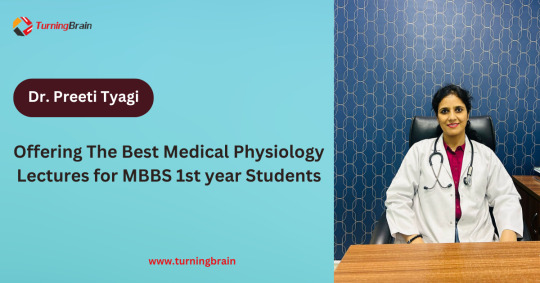
When it comes to mastering medical physiology, Dr. Preeti Tyagi is the name to remember. With a stellar academic background – securing the 6th rank in CPMT – and degrees from the renowned Institute of Medical Sciences at Banaras Hindu University, Dr. Tyagi brings is the Best Medical Physiology Lectures for MBBS 1st year a wealth of knowledge and experience to the table.
Currently serving as an Associate Professor at Vardhman Mahavir Medical College and Safdarjung Hospital in New Delhi, Dr. Tyagi goes above and beyond to make quality education accessible to all. One of her standout contributions is her series of physiology lectures, delivered in a blend of Best Physiology Video Lectures in Hindi and English (Hinglish), and available for free. These lectures cover the entire MBBS physiology curriculum, catering to students preparing for MBBS, NEET-PG, MCI, nursing, and paramedical exams. She is the Best Medical Physiology Video Lectures in Hindi.
What makes Dr. Tyagi's lectures special is their simplicity and clarity. She breaks down complex concepts into easy-to-understand explanations, using real-life examples to make them stick. In a world where quality resources often come at a cost, Dr. Tyagi's commitment to providing free, high-quality education is truly commendable.
For MBBS 1st year students looking to ace their physiology exams, Dr. Preeti Tyagi's lectures are a godsend. Not only do they help students pass exams with flying colors, but they also lay the groundwork for a deeper understanding of the human body. Dr. Tyagi's dedication to making learning accessible and enjoyable sets her apart as a true educator and mentor.
With Dr. Preeti Tyagi leading the way, medical education in India is taking a giant leap forward. Her passion for teaching and unwavering commitment to students' success make her a beacon of hope for aspiring medical professionals everywhere. Dr. Preeti Tyagi is the Best Physiology faculty in India.
Turning Brain - An APP of Full Course Medical Physiology Lectures in Hindi-English mix language for MBBS 1st Year, FMGE, NEET-PG, BDS, Nursing, MSc and Paramedicals Students By The Best Physiology faculty in India Dr. Preeti Tyagi.
Visit Our Website: https://turningbrain.in
Youtube Channel link: https://www.youtube.com/@dr.preetityagilectures874
#TurningBrain#MedicalEducation#PhysiologyLectures#MBBS#FreeLectures#DrPreetiTyagi#medical#nursing#physiology#anatomy#joinus#drpreetityagilectures#bestmedical
5 notes
·
View notes
Text
Which is The Best Course After BDS

Completing a Bachelor of Dental Surgery (BDS) is a significant achievement, but many dental graduates seek to further their education and specialize in specific areas to enhance their expertise and career prospects. Some of the best courses after BDS include the Master of Dental Surgery (MDS), which allows students to specialize in various fields of dentistry, such as orthodontics, prosthodontics, periodontics, oral and maxillofacial surgery, conservative dentistry and endodontics, and pediatric dentistry.
The Master of Public Health (MPH) is an excellent option for those interested in broader aspects of healthcare, focusing on public health principles, epidemiology, biostatistics, health policy, and community health. With an MPH, graduates can work in public health administration, health education, and health policy planning, equipping them with the skills to design, implement, and evaluate public health programs.
The Master of Business Administration (MBA) is a game-changer for dentists aspiring to combine clinical practice with business acumen. This degree covers various aspects of business management, including finance, marketing, operations, and strategic planning. With an MBA, graduates can manage their own dental clinic more efficiently, take on administrative roles in dental organizations, or work in healthcare consulting.
Fellowship programs offer advanced training in specific areas of dentistry, typically shorter than degree programs. Popular fellowship programs include Fellowship in Cosmetic Dentistry, Fellowship in Implantology, and Fellowship in Oral Oncology. These programs provide practical skills and knowledge, allowing students to quickly enter specialized fields of dentistry.
Diploma courses are another excellent option for BDS graduates looking to specialize in specific areas, such as Diploma in Orthodontics, Diploma in Oral Surgery, Diploma in Endodontics, and Diploma in Periodontics. These courses can provide practical skills and knowledge, allowing students to quickly enter specialized fields of dentistry.
For those interested in academia and research, pursuing a PhD in dental sciences can be highly rewarding. With a PhD program, graduates can work as researchers, academicians, or consultants, playing a crucial role in advancing dental science.
#ivf training#pg diploma in clinical embryology#clinical embryology courses#after bsc nursing course#which is the best course after bds#which is the best course after bhms#msc in life sciences
1 note
·
View note
Text
WORKING AT BRAWN GP (James part)
2/14, 2011
Name: James Vowles
Job Title: Race Strategy Engineer
Age: 30
Lives: Oxford
Hobbies: Motorbikes, Motorsport, Mountain Biking
Q. What studies did you complete before you worked in Formula One?
A. I wasn't entirely sure where I wanted to go in life when I was younger. I can say I was studious as most of my school reports stated James is clearly very intelligent, when he applies himself! I completed most of my education in Geneva at an International School and at about 16 years old, I started to dedicate myself a bit more, particularly enjoying Maths, Physics and Computing. This led me to return to the UK to study Computer Science at the University Of East Anglia as a stepping stone until I figured out where I was destined. I had done my fair share of karting to this point and loved motorsport. When I was growing up Sundays were mostly spent watching Formula One races with a friend who truly was like a brother to me. Until that point I considered motorsport a far fetched dream and after sending out CVs to all the F1 teams, with zero positive results (including one CV actually sent back to me!), I decided to dedicate my life to both getting into and then being successful in F1. I started working weekends at Snetterton Race Circuit, which was near my University, with Formula Ford and GT teams, building up both experience and contacts, until I finished my degree in 2000. From there, I was one of 20 students lucky enough to be selected for the first Cranfield University MSc in Motorsport Engineering course. The course was a baptism of fire, with the other 19 students being of extremely high calibre, all with Engineering backgrounds, most of who now work in either F1 or GP2. In September 2001 I graduated with a distinction, picking up a Prodrive award for the design of a school racing car.
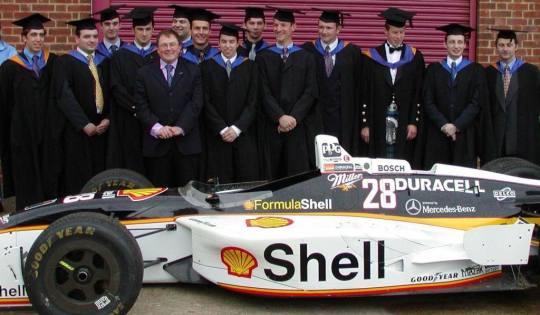
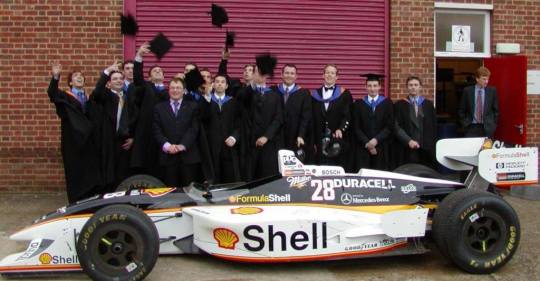
Q. Where did you work before Brawn GP?
A. In terms of motorsport, I started where all budding engineers should – scrapping rubber from GT racing slicks in a cold garage on a Sunday morning! When I was still doing my MSc in 201, Ray Rowan, who ran successful FIA Sportcars and F3 teams, gave me my first engineering role. I started as the Data Engineer for the F3 team and after a few months Ray felt comfortable enough to let me run the programme and engineer the car
from then onwards. That same year I became the Senior Race Engineer on their Le Mans programme, taking the Pilbeam LM675 car to Le Mans. In 2001, I applied for an Assistant Race Engineer position with British American Racing, and whilst I wasn抰 accepted for that role, I made enough of an impression for a new role to be created, and my first goal of entering Formula One was achieved. In 2002, I started work on a Race Strategy system and shortly afterwards joined the Race Engineering department and started travelling to the races. My role has expanded over the years combining Race Engineering duties, Friday car running with Anthony Davidson as our third driver in 2004 and 2006 and of course Race Strategy. In 2008 I was privileged enough to start working with Ross Brawn and we haven looked back since.
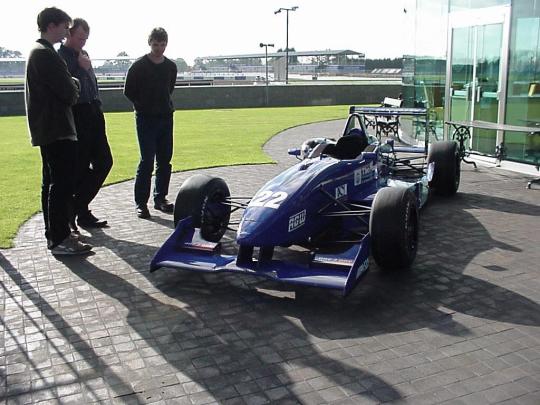
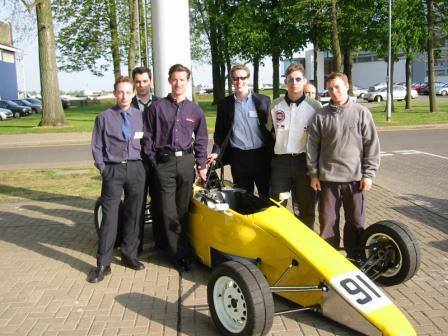
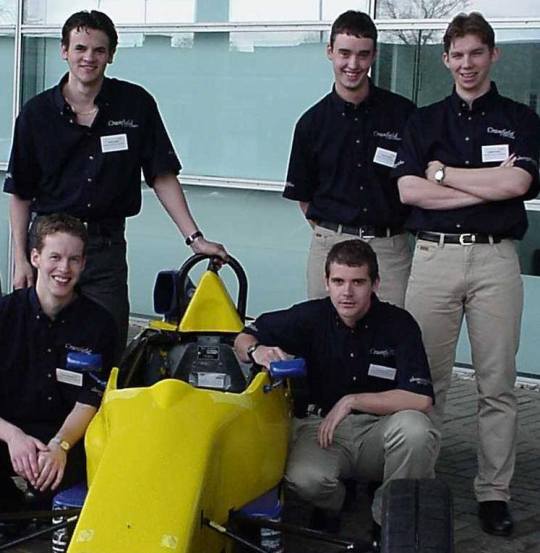
Q. Describe your job on a day-to-day basis?
A. Prior to each race, I gather all the historical data, patterns (traffic, overtaking, track changes) and team performance data. Brawn GP has a number of custom simulation packages which we run to ensure that we gain a good understanding of the running plan for the weekend and the estimated tyre performance, highlighting any potential problems and considerations. During Friday we will build a picture on our competitors performance, tyre usage, weaknesses and strengths. I work closely with the senior race engineers to ensure we get the most out of our car and modify the run plans if required during sessions. The Friday data then allows us to determine a qualifying plan including which tyre compounds and in what order and just as importantly, the final qualifying fuel figure. We always create several plans, depending on where our competitors are relative to us in each qualifying session. On Sunday morning Ross and I sit down and discuss all of the potential race scenarios and plan actions for various events such as safety car deployment and accidents. This planning is the key to solid race strategy as we may only have a matter of seconds to react to incidents on track. During the race, the decisions we make are what order to run the tyre compounds, what the next stop lap will be, what to do in case on safety cars on every lap, who we are fighting, and what we can do to defend or beat them. We are continuously updating the driver with his targets, both lap time and position to allow them to manage their tyres and the gaps to other cars around and ultimately their pace. Following the race I will analyse all of the decisions and data gathered from the event, understand what we did right, and what we could have done differently and improved on. This analysis is then used to build a further understanding with regards to our competitors for the following event.
Q. What do you like about working in Formula One?
A. Formula One is unique – it's my passion, my hobby, my life. Outside of the race weekend, the entire team is trying to work harder, faster and better than the nine other teams to ensure that by the next race, we do a better job than them. The business solely
focuses on a single event, which lasts around two hours roughly every other week, where the result of hard work and dedication can be seen the world over. The other aspect is the reactivity of Brawn GP and how quickly we can react to other competitors, rule changes, and problems. We are able to draw, manufacture and run components that were first discussed only a few weeks ago.
Q. What's the best thing about working for Brawn GP?
A. For me, it's all about the people you work with, the team work, the development. The race engineering group has been together for a long time and is very close which makes for a great working environment. I think it抯 fair to say the engineers spend nearly as much time together as we do with our respective partners! The other reason is Ross Brawn who has changed the way we work together as a team. It's a privilege to work alongside him during a race weekend.
Q. What’s the most challenging aspect of your job?
A. The first challenge is making a strategic decision during qualifying or the race, sometimes in just a few seconds, based on as little or as much data you have available at that time. The difference between making a good or bad decision can be as much as several positions by the end of the race and therefore having the most accurate data possible at all times is key to this. The second is managing driver expectation and performance over a race weekend. During the race the goal is to work with the engineers to give the driver targets to hit, manage his pace, and keep an eye on your competitors to understand both their performance and usage of tyres.
Q. What has been the best moment of the 2009 season so far?
A. There have been several. The first would be when we took the BGP 001 car to Silverstone watching Jenson drive a few laps to ensure all was well before we shipped the car to its first test. The relief from where the team was just a few months ago was indescribable. However my best moment in 2009 was, without question, Monaco. A one- two result from Jenson and Rubens is an incredible achievement. More specifically from a strategic perspective, we had the right strategy, putting the cars first and third on the grid. We managed a difficult tyre situation and reacted quickly to the dynamic race to bring the cars home first and second. At the end of the race I was standing just next to the podium, Ross Brawn just behind me with his elbows on my shoulders watching Jenson running down the straight after leaving his car in Parc Ferme. It's a memory that will stay with me forever.
2 notes
·
View notes
Note
i saw in ur bio it says ex-biochemist, i’m a rising 4th year biochemistry major and i’m curious about your career path! i don’t know many others who aren’t on the general medicine /med school track so i like to ask to get ideas from people what i’m gonna do after uni. my current plan is work in drug discovery r&d. if u don’t want to post for any privacy reasons just send me a chat on inbox :)
it's ok dw, i've been quite open abt my career & education here and on my former studyblr / skincare side blog @birdkoskincare (now abandoned, RIP). i went into biochem bc it was as broad a degree as i could choose within the life sciences but i really had no idea what i wanted to do with it, so it was essentially me pushing away the decision further.
then in my 2nd yr of uni i started getting more interested in cosmetics & skincare so i pursued that when it came to my MSc. there are no cosmetic sci degrees in portugal so i went for pharmaceutical tech which has a lot of overlap re: formulation and also features some cosmetics units. i did my final project & dissertation as an intern through erasmus for a european cosmetics company and worked as a formulator for them for 6 months, then graduated just as the pandemic hit.
right after graduation & defending my thesis, i started working as an intern for a local company through a govt program. i agreed to it bc a) money and b) they said it would be cosmetics-related, but it ended up..... not being in my area (formulation) at all, and being much more related to pure biochem research, lots of it not even tangentially related to cosmetics. tbf i also grew a lot more disillusioned w/ the cosmetics world, so there's that, but i really disliked working for this company and as soon as the govt funding ended they didn't re-hire me either, so good riddance.
by then my health had gone to shit and i couldn't job hunt. luckily i'd been preparing to start doing art commissions when that happened, and it's actually gone really well and it's now officially my full time job. i'm only able to do it bc i have my partner carrying most of our expenses, since i don't even make minimum wage most months, but it's much better to be self-employed as a chronically ill person. i like it a lot better than academia & STEM. i still have some papers to finish from that biochem research so that people stop bothering me about it, but i don't see myself returning to that field any time soon.
so idk if this is helpful at all since i've abandoned the biochem life! but yea that's my career path. drug discovery is super interesting, i took a few electives in that direction during my BSc, best of luck!
7 notes
·
View notes
Text
Life is not easy for any of us. But what of that? We must have perseverance and above all confidence in ourselves. We must believe that we are gifted for something and that this thing must be attained.
On my corkboard hangs this Maria Skłodowska-Curie quote, written on a post-it note that used to be orange but no longer is, because I'd kept it near the window before I moved it here.
Do you know why fabrics get pale in the sun? The plushies and the journals stuck to the windows of the corner store, all colorless now. Funny thing, it's because of oxygen - although the sunlight plays a crucial role too, because its photons carry enough energy to make the oxygen's electrons pair up. Chemists and physicists call it the singlet oxygen. That isn't the "preferable" state, and so singlet oxygen readily reacts with most of the organic compounds it encounters - like the dyes in our clothes and books and toys and post-it notes - breaking them down and making things lose their colors.
I learnt this in an inorganic chemistry lecture a couple of months ago, thinking mostly about how the professor could turn it into an exam question.
Now, a moment of wonder. Staring at the no-longer-orange post-it note.
Another MSC quote that I don't have on my corkboard: I am among those who think that science has great beauty. So do I, without doubt. How amazing is it to see this common phenomenon that we so rarely think about and understand it on a molecular level? How amazing is it to watch another little secret of our world reveal itself? To sit at the bus stop, waiting, look at some miserable, old souvenir at the window of the nearby kiosk, most of its colors gone, and think, "I see! I understand! I know how this happened!"? Is it not beautiful? Is it not wonderful?
#science doesn't strip the world off its beauty#science enhances the beauty of the world#isn't to love to understand?#txt#studyblr#chemblr#op
24 notes
·
View notes
Text
Catching up with life.
It's been over five years since I graduated from university, and here I am, once again, applying for jobs like a robot. I have sent over 4 to 5 job applications per week, tweaked my CV individually once a month, and hand-crafted my cover letter uniquely for each jobs I applied to. To top it off, I have been doing this for 2 years combined. Assuming that is not an overstatement, I have been sending over 300 job applications to different schools, universities, and even across other industries. With this overkill—yet seems to useless—Masters degree, it does not serve as a selling point, since it is being considered inconsistent with the common practice prevalently found in Indonesian universities, that one's Masters degree should be linear in order to work in academia as a lecturer. I even had to consider dropping my Graduate degree and went with my Bachelors degree to apply for jobs. People kept saying that biotech is the future, that the sciences are dawning all over, technology grows at light-speed, but all I experience is frustration and anguish. People kept telling that I am overqualified, that there's no way I am always between jobs with such emotive motivation and carefully curated skills and my beautifully AI-tweaked resume. I’m seriously starting to consider giving up this life and trekking into the wild to make my new life, Randall Clark-style. Here I want to reflect back on my past few years' endeavor and remind myself that job-seeking is such a dehumanizing process and something must be done to fix this. But before that, a quick background on my life so far. Consider this as a short, catching-up telltale.
Right after graduating in 2018, I was so motivated to fix the education system. I applied to teaching jobs and got myself a first formal job teaching Biology and caring for a dormant Science Club back in my alma mater. Why not apply for the industry sector, you ask? There's not enough room for Biotech graduates in Indonesia, and despite what people say about the unique nature of the niche, most of the positions can either be filled with Chemical Engineering graduates, or just General Biology graduates. There's not enough value created by pursuing Biotech degree, apart from continuing in academia as a researcher. After one year, I didn't renew my contract and decided to pursue for higher education, which I thought it was necessary to create a bigger impact. I thought back then, "Here I am, teaching young generation Biology and the art of life, some of them might be doctors or environmental engineers, yes, but majority of them won't even need these stuff." I said that to myself, exactly like I was thinking back then when I was their age and learning mathematics. it was 2019 when I decided to pursue MSc/PhD Biotechnology abroad, to allow myself to engage with wider masses upon completion. This time, high-schoolers, next up, college students, or so I thought. But life is a bitch, and then we all gonna die anyway.
Luckily at that time, right after my resignation was granted, I got myself three Letters of Admission: from two different universities in The Netherlands and one from Sweden. I'd then applied for several scholarships program, one of them being the notorious LPDP. The task of simply qualifying for the first round of paperwork selection was very tedious and stressful. It was my first time dealing with a plethora of documents to prepare, and I could say the tears and blood was even worse than the process of getting an LoA from the three campuses. After two more selection stages, long story short, I didn't qualify after the interview process, and I plunged myself in depression. A month later, I collected myself to start over, and this time, applied for jobs in the edtech startups. My thoughts were somehow I could work for a while, save enough money while still creating impact, and fund my Masters off my own deposits. Well again, fortunately I told myself at that time, some unicorn companies contacted me, and somewhat early that year, precisely February 2020, I was called into one of the big edtech company to attend an interview. I scrambled to book a ticket and a homestay for 2 days and... Oh boy. Three days before my departure, Jakarta shut down the borders and Covid ruined my lifelong dream of studying abroad. Interview cancelled, plane ticket burnt, and that hotel bed never touched my back. No job, no credit, eat shit. All 2020 I cried myself to sleep.
The anxiety caused by the uncertainties was so dreadful, I fantasized going for a program—the one in the Netherlands—anyway. Talk about coping using unrealistic expectation. So I emailed the admissions office and requested to postpone my first semester to October 2020 or March 2021 (they granted the former but refused the latter). I even paid for the dorm room in the Netherlands, when I was very certain that this was just another viral outbreak that's gonna resolve on its own after several months (that was also a false hope). Then, my family business took a major hit due to lockdowns imposed by the local government, and everyone went nuts. All plans go bust, and out of nowhere, suddenly, all homeschool students I have been teaching stopped responding to my calls. All types of businesses from across all sectors took a hit. Purchasing power bottomed out. Monetary circulation grounded to a halt. In the midst of all this blazing hellfire that is a financial crisis, it was in the middle of 2020 when I applied for student loan to get myself into a campus in Jogja. I thought "Well, it can't be that bad, right, I can still go to Jogja and pursue another Masters here, domestically, without going abroad and waste lots of money." So did everybody else thought, when we all first had our online classes in October 2020. But fast forward to early 2022, It's like everyone skipped two years of their life, staring at the screen for several hours drying out eyeballs and get nothing from classes other than just one or two classes that are actually elective subjects, not among the core courses.
I greeted 2021 with much hope, a hope that someday I will be able to meet my classmates and hunt for Jogja food later in the day after classes. I would have scoured through the libraries of the renown, and I would have also joined several student councils during my studies. But no. Not even once we got a call from campus saying our classes would go from distanced learning to on-site learning. I spent 2021 lurking around Malang trying to find a closure, visiting many natural places where I used to enjoy, gulping so many unhealthy foods down my throat to ease the numbing pain, even engaged in some risky behavior of ████████████. The year ended with more student debt, an unfinished thesis proposal, a broken heart, and still, no single job interview landed. Yes, I even went through Masters fully online (including all of the phases of research). I spent all 2021 mourning the hundreds if not thousands of what-ifs while drafting my thesis proposal. A small ember light up in the darkness, I got myself a job replacing a science teacher in Surabaya during her maternity leave. I got the contract extended just before I finished my thesis defense, and I am stuck in Surabaya for another year of inconsecutive work experience. Not even a single time I ever stepped my soles on campus grounds in Jogja during my enrollment there. The only chance I got to be closer than ever to my supposed campus building is during my awards ceremony where I returned my graduation robes.
I got paid three times the amount I got when I was working in my alma mater. I got myself a small room not too far away, and after selling my family's car, I even got a small discount since I am not using the provided parking space anymore. Plus, after over half a year, I can save more than I could usually save because there are no more gas-hungry beast that is my 1.5L turbocharged CVT Medium SUV. The school itself was decent, I got mediocre lunch everyday and to be honest there are less paperwork than the previous jobs I had been working on, but oooh the lab equipment and the learning materials are very lacking. I requested for some upgrades here and there, and they didn't even bat an eye. I have to struggle and come up with weird hyper-crearive plans to deliver the lesson, which by the way are not just biology, but also physics, chemistry, and geography. I enjoyed most of my time teaching, but considering a majority of students would leave the school and continue somewhere else, the school management decided to cut over half of the staff earlier this year. By the time of writing, I still need to finish my contract, though. Fortunately, I got some leeway since there are less classes to teach now after Cambridge exams has passed. This is where the fun begins. Not another job hunting. So, wish me luck friends.
3 notes
·
View notes
Text

Apply Now for MSC Biotechnology Admission 2023
Gujarat Biotechnology University (GBU) is a modern university near GIFT City, Gandhinagar. Funded by the Government of Gujarat’s Department of Science and Technology, GBU will create a culture of excellence and innovation with entrepreneurship at its core. GBU offers Masters by Research and PhD biotechnology programmes with a strong translational focus, aiming to deliver biotechnology solutions for society, engaging with the vibrant life science industry in Gujarat, and across India.
Read more: MSc Biotechnology Admission 2023-24
#biotech#biotechnology#biotech and pharmaceuticals#india#education#biotechnology university#Msc Biotechnology University#Apply Now for Msc Biotechnology
2 notes
·
View notes